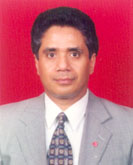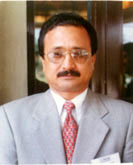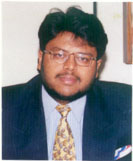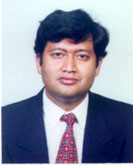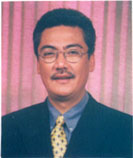
July / August 2001
NEPAL
|
35th AGM of FNCCI Concluded New President & Executive Committee Members Elected
Similarly the newly elected Executive Committee held its meeting in Kathmandu. At the meeting Binod Bahadur Shrestha, Rajendra Kumar Khetan, Chandi Raj Dhakal and Suraj Vaidya have been elected to the posts of first, second, third and ex-officio vice president and chairman, Employersí Council of the FNCCI respectively. Delivering a welcome speech during the inaugural session of AGM, the then President Pradeep Kumar Shrestha spoke, only team spirit could rander better results in the country as a business organization. Proposing vote of thanks, the then first vice president of FNCCI, Ravi Bhakta Shrestha said that the responsibility of the Federation is increasing along with the rising glory. In a bid to forge a national consensus among all the political parties, a comprehensive interaction among the political parties will be held soon said Shrestha.
NRB is preparing new license
policy The central bank currently lacks a clear cut policy for granting operation license to any new commercial bank. According to a high level source in the central bank, the policy has been formulated by a team of experts, who are likely to finish all tasks by the end of August. Many aspirant investors are in the line to establish commercial banks. However, the NRB has not registered applications for the establishment of commercial banks since last five years primarily due to a lack of a concrete policy. The source also informed that the applications would be registered only after the enforcement of the new policy and operating license would be granted as per the new policy. The policy under formulation is expected of being able to provide clear answers about the role and requirement of commercial banks. How many commercial banks are required to stimulate economic development of the country, how much banking capital is necessary to keep various monetary varibles in balance and which geographical location needs new commercial banks, are some of the questions that would be answered by the new policy, said the source. The policy will also sketch out the required qualities of the promoters of the upcoming banks. Though currently there are fifteen commercial banks in operation, they are heavily concentrated only in the urban sectors of the country, Thereby dampening the government efforts of extending banking service to the rural sector for capital mobilization. Recently, amid much controversy,
with an aim to develop healthy banking practices by lowering the
risk of investment and deposits, the central bank issued a set
of new operational directives to the commercial banks. The agreement was signed by the then FNCCI president Pradeep Kumar Shrestha and Japanese Ambassador Mitsuaki Kojima at the FNCCI secretariat. On the occasion Ambassador Kojima said the healthy progress of the private sector is a step towards sustainable development for developing countries like Nepal and that Japanese assistance has been provided for socio-economic development as well as development of democratic procedure. Nepal should attract international market through its unique production, Ambassador Kojima said adding that pashimna products of Nepal could become a successful product in Japan as well as in the international market. Nepal ranked at 129th position Nepal has leaped to the 129th position from the earlier 144th out of 162 countries in the Human Development Index (HDI) - 2001, according to Human Development Report - 2001 which was made public worldwide recently. At the formal launching of the Human Development Report (HDR)-2001, United Nationís Development Programmeís (UNDP) resident mission in Nepal disclosed that over the last 25 years Nepal has been steadily progressing in human development and that the indicators were gradually recovering. Explaining the improving indicators the report says that a child born here in the late 90s can expect to live 14 years longer than could a child born in the early 70s. Similarly, the infant mortality rate decreased from 165 in 1970 to 75 in 1999. Likewise, the under-five mortality rate has decreased from 250 in 1970 to 104 in 1999. From the statistics it can be fairly said that Nepalís HDI has been steadily increasing and the gap with the neighbouring countries has been reducing. The report has, meanwhile, discovered Nepal as home to 10 million people living in absolute poverty. In terms of Human Poverty Index (HPI) Nepal ranks 77th out of 90 developing countries. The report has found more than half of the adult population as illiterate. Likewise, it has painted a bleak picture when it comes to female education in the country. It says that out of 146 nations there are only there countries that have lower literacy rates than Nepalís Female literacy rate in Nepal is as low as 22.8 percent. Health wise, the report again discloses Nepalís poor health condition. According to the report, Nepal is one of the few countries in the world where female life expectancy is lower than that of males. Technologically also, Nepalís ranking is not that remarkable. It is ranked 69th out of 72 countries in the technology achievement index. The report has also found that the problem of Ďbrain drainí cost millions for the developing countries like Nepal. Handicraft exports slump Slide in the export of pasmina in the second half of the last fiscal year, coupled with a decline in the export of hide and woolen products, among others, has pulled down the aggregate handicraft exports of the fiscal year 2000/01. According to Handicraft Association of Nepal (HAN), handicraft items worth Rs. 6.82 billion was exported in the last fiscal year. However, the handicraft export figure for the fiscal year 1999/00 had stood at Rs. 7.16 billion. While exports of pasmina in the previous fiscal year touched Rs. 5.64 billion, the figures last year were less by over Rs. 20 million. HAN has attributed low international demand for pasmina as the main reason behind its fall. Apart from pasmina, fall in the export of woolen products also contributed to a fall in the total handicraft exports. Woolen products exports in the last fiscal year slumped by over 50 percent as compared to the previous yearís exports. Woolen products worth Rs. 591.2 million were exported in the previous fiscal year. However, woolen products worth only Rs. 243.9 million were exported last fiscal year. The item slipped to the third largest handicraft exportable item last year from the previous yearís second position. Thought hide exports climbed up to the second position, from the third total hide exports in the last fiscal yearwas only Rs. 245.5 million, against the previous yearís 256.6 million. Deceleration in the export growth in the first eleven months of the last fiscal year is another reason for a fall in the total handicraft exports. While aggregate exports in the previous year had grown at almost 40 percent, the growth rate last year was only 15 percent. Nepal to host FAPPA meet in 2003 The 20th meting of the Federation of Asia Pacific Air-cargo Association (FAPPA) will be organized in Nepal in 2003. It was decided at the 18th meet of FAPPA held in the Philippine capital of Manila from June 17 to June 20. According to Nepal Freight Forwarders Association of Nepal will host the FAPPA conference after the 19th FAPPA meet in Sri Lanka in 2002. The meet also ratified Nepalís full-fledged membership with FAPPA. Fifteen countries from the Asia-Pacific region are members of FAPPA, including Nepal, Hong Kong, Australia, South Korea, the Philippines, Chinese Taipei, Thailand, Singapore, Indonesia, Macao, Malaysia, India, Sri Lanka, Brunei and Bangladesh. US import policy hits Nepali garment export Nepali garment export has been adversely hit by the new import policy of the United States of America. According to readymade garment entrepreneurs and exporters under the new US policy, developing countries in the Sub-Saharan Africa and the Caribbean region are entitled to a quota-free access at a subsidised duty to the US market. They said the privilege of the US import policy has cut the cost of these countries and increased their competitive strength, thereby hitting Nepali merchandises. In the last six months, Nepali readymade garment export has slumped by 8 percent as compared to the previous year. GAN officials stressed that the government should take initiatives to get this privilege, as Nepal also falls in the category specified in the US policy for being eligible to the privilege. The privilege, according to the US policy, is available to the developing countries with less than 1,500 US dollars per capita income. They claimed that, in principle, Nepal being a land-locked country with less than 250 US dollars per capital income is also entitled to the privilege. Some countries in the SAARC region including Bangladesh and Sri Lanka have also stepped up action to obtain the privilege from the US, and if they are successful in their bid, it will further have a negative impcation Nepali garment export to the US market. GDP growth estimated at 5.8% The countryís Gross Domestic Product (GDP) is estimated to record a growth rate of 5.8 percent in 2000/01 of which agriculture and non-agriculture sectors posted the growth rate of 4.00 percent and 6.90 percent respectively. The GDP in the last fiscal year 1999/2000 grew by 6.4 percent with the agriculture and non-agriculture sectorsí growth figuring 5.00 percent and 7.40 percent respectively. The GDP growth has been calculated at the factor cost at the constant price of 1984/85. This was disclosed in the Economic Survey 2000/01 commissioned and released by the Ministry of Finance recently. The publicising of the survey findings came one day ahead of the presentation of the national budget in the House slated. The survey also reports a marginal rise of 2.10 percent in the national urban consumer price index during the review period of the current fiscal year. The total government expenditure grew by 11.2 percent and stood at 66,272.50 million during the review period. Of the total, the regular and development expenditures grew by 11.2 and 11.3 percent respectively. |
